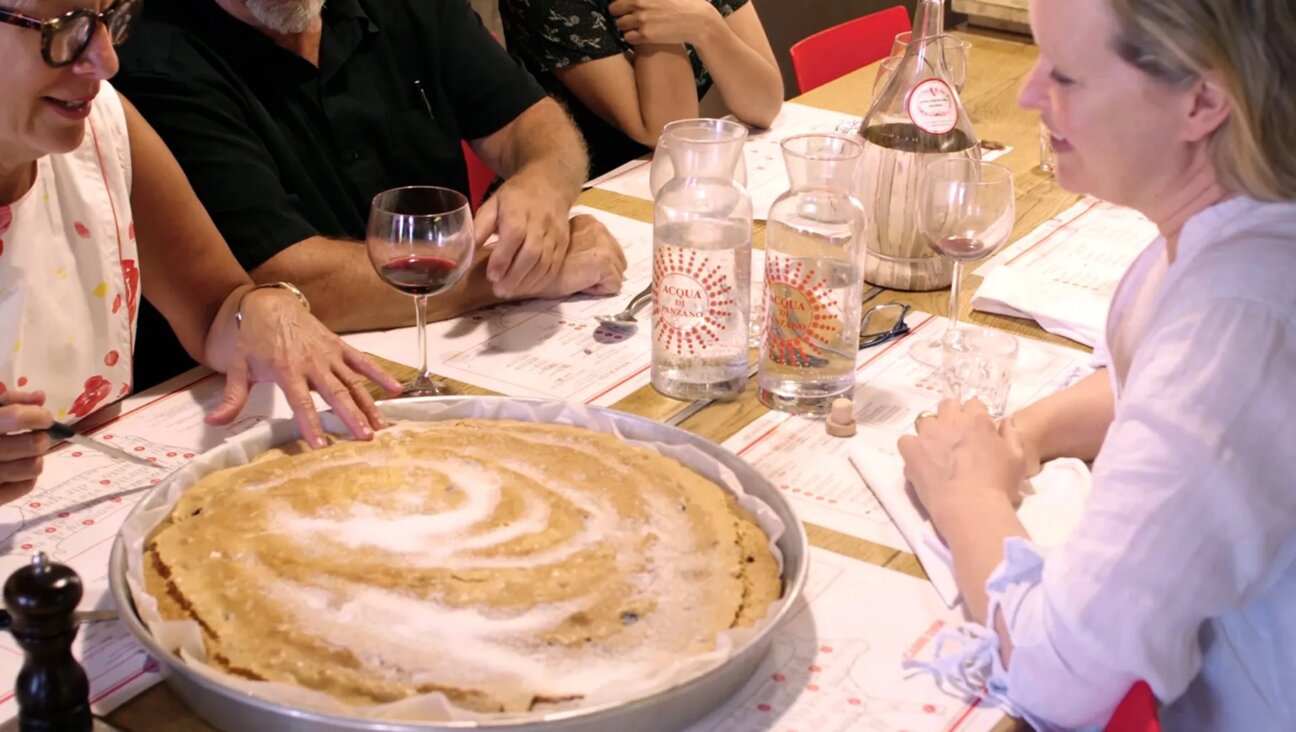A 500 Year Old Rosh Hashanah Recipe

Graphic by Angelie Zaslavsky
As soon as September starts, my mind turns to high holiday cooking and the intoxicating smells of one my Sephardic family’s favorite dishes – Salade de Piments, more widely known as matbucha. It is a transporting elixir of garlicky, semi-caramelized roasted peppers and tomatoes. Layered with smoky, piquant and subtly sweet flavors, it’s a perfect counterpoint to any meal — from brisket to omelet — or simply savored on bread.
Despite the lengthy prep time, the dish has been relished by Mediterranean Jews for nearly 500 years. I love to serve it for Rosh Hashanah when local peppers and tomatoes are bountiful.
My family’s Salade de Piments recipe has roots in the Spanish Inquisition when, rather than face death or conversion, my ancestors chose exile to Melilla, a coastal town in Spanish Morocco. It was around the same time that Christopher Columbus returned from the New World with his exotic booty, including peppers plucked from South America; tomatoes followed from Peru via Cortez in the mid-1500s.
The dish, which is made by roasting peppers and simmering them with the other ingredients, fit well into the local cooking of the time, explains Sephardic culinary historian Janet Amateau, who blogs at Sephardicfood.com. The combination is commonly known as matbucha, a generic term that means “cooked salad” from the Arabic word, tabukh (to cook), also known in France as Salade Juive, Jewish salad.
The Moroccan technique for matbucha always begins with roasting the skin of the peppers to remove it, says Amateau, then local tastes and customs take over. In its infinite varieties Salade de Piments is a staple in Spain, North Africa and the Middle East. “In Turkish Sephardic tradition you’d use lemon for a touch of acidity, and not too much garlic,” she says. “Moroccans favor coriander and cumin…and Tunisian versions include hot paprika.” Adding sherry would tie my version closer to its Spanish roots, a twist I can’t wait to try.
The process of making the dish is a long one but I savor the communal task of roasting, peeling, de-seeding and cooking the peppers, which carves out precious family time, and was an annual ritual during my childhood. While the dish simmered delectably, my mother, sister and I would laugh, sing and dance through the kitchen. We’d call relatives abroad, play cards and Mom would tell stories about my Spanish grandmother Miriam, a mother of ten whose busy hands were kept youthful with olive oil. Making the dish now that my mother has passed brings me close to her again – and conjures similar scenes from Mediterranean kitchens dating to medieval Spain.
Salade de Piments (Matbucha)
Unlike other versions, my family’ recipe uses no Middle Eastern spices. Just peppers, tomatoes, garlic, bay leaf, salt and pepper. Red pepper flakes are optional (alternately, you can substitute a few hot peppers for heat). It benefits from sitting in the fridge, covered for a few days, where it will last a week or longer. Serve at room temperature.
It’s beautiful, especially as part of a mezze of colorful appetizers or side dishes that might include Moroccan spiced carrots, roasted beets, tomatoes with fresh basil.
6 sweet bell peppers, varied colors if available
12 Roma tomatoes
4 cloves garlic, sliced thin
1/2 cup olive oil
1 bay leaf
pinch red pepper flakes
pinch of sugar
1 tablespoon tomato paste (optional)
salt and pepper to taste
1) Preheat oven to broil
2) Prepare peppers: Set broiler on high and arrange peppers on a foil-covered baking sheet 4-6” from flame, turning often with kitchen tongs until blackened on all sides. Or you can roast over a gas flame, turning evenly. Place in a paper or plastic bag for at least 15 minutes to loosen skin. Peel, core, seed, and cut into ½” strips.
3) Prepare tomatoes: Score tomatoes. In a large pot of boiling water, submerge for 10 seconds and remove with a slotted spoon. When cooled, peel, core, seed, and cut into ½” strips.
4) Bringing it together: Heat olive oil in a large pan over medium-high heat. Add garlic (and optional red pepper flakes) and cook until scented, but not browned. Add peppers, tomatoes, and bay leaf. Reduce heat to a slow simmer, stirring periodically. After one hour, add ½ teaspoon salt, taste for bitterness, and add a pinch of sugar if necessary. Simmer for another 45 minutes to an hour, uncovered to reduce and thicken the sauce, until tomatoes have disintegrated, but peppers still retain some shape. Salt and pepper to taste.
Salade de Piments is best served at room temperature or chilled. Store covered and refrigerated for up to a week, or frozen for up to 3 months.























